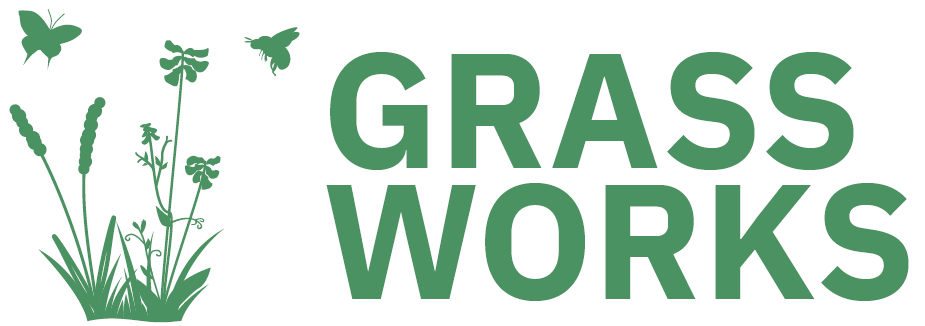About GRASSWORKS
Work Packages
The research within the Grassworks project is divided into six interrelated Work Packages (WPs see the diagram). Within these, ecological and socio-ecological post-hoc studies of restored sites will be carried out (WP1 & WP2), and real-world laboratories will be set up (WP2) to initiate a transformation process for grassland restoration in three model regions in Germany.
Furthermore, knowledge transfer into practice involving stakeholders will be developed (WP3), and economic and political factors will be analysed to derive policy recommendations (WP4). Finally, the results will be synthesised into transdisciplinary participatory models for restoration success that can be used by practitioners (WP5). All of these outputs will follow a holistic approach and take the ‘leverage point perspective’ in working towards knowledge integration (WP6).
Overview of Work Packages
WP6: Integration
Lead: Leuphana Universität Lüneburg (LUL)
WP1: Post-hoc analysis of 120 implemented restoration sites in 3 model regions (North, Central, South)
Lead: Leuphana Universität Lüneburg (LUL) & TU München (TUM)
WP3: Knowledge transfer and stakeholder participation
Lead: Deutscher Verband für Landschaftspflege (DVL)
WP5: Synthesis
Lead: Thunen-Institut (TI)
WP4: (Socio-)Economics and Governance
Lead: Universität Greifswald (UG), Thünen-Institut (TI)
WP2: Initiation of the transformation process in three Real World Laboratories
Lead: Hochschule Anhalt (HSA) & Leuphana Universität Lüneburg (LUL)
WP1: Post-hoc analysis of 120 implemented restoration sites in 3 model regions (North, Central, South)
The varying success of different restoration projects allows conclusions to be drawn about the functionality of different restoration methods and procedures under different conditions. Therefore, in this part of the project, 120 restored grasslands in the 3 model regions (North, Central, South) will be evaluated for their ecological, socio-ecological and economic success. For this purpose, criteria for site selection have been defined and the sites have been selected in such a way that they represent as wide a range as possible. The sites will be analysed and assessed ecologically (soil, vegetation, butterflies & wild bees, landscape connectivity and complexity), socio-ecologically and socio-economically (integration of restoration measures into farms, management and governance structures) to allow for a holistic assessment of restoration success. The assessment of success is based on both positive and negative reference sites.
WP2: Initiation of the transformation process in three Real World Laboratories
Real World Labs are experimental spaces at the interface between science and society, where scientists work together with local actors, learn from each other and try things out. They thus offer great potential for initiating transformative processes and generating knowledge. In this part of the project, such transformative processes will be initiated in three Real World Laboratories. The state of knowledge and the values of relevant groups of actors will be compared in different aspects in pre- and post-project evaluation phases. Furthermore, restoration measures will be assessed, planned and implemented together with these actors, and demonstration areas for grassland multifunctionality will be established to facilitate knowledge transfer.
WP3: Knowledge transfer and stakeholder participation
For successful, long-term restoration of grasslands, the application and therefore knowledge of appropriate restoration methods is crucial. This part of the project will therefore be concerned with the collection, aggregation and dissemination of knowledge, with the involvement of practitioners. For this purpose, an online restoration toolkit will be developed. This toolkit will provide evidence-based knowledge about restoration measures from science and practice in order to promote mutual learning and integrated decision-making processes. In addition, this knowledge will be disseminated through the networks of landscape conservation organisations and thus increased throughout Germany.
WP4: (Socio-)Economics and Governance
The governance of restoration is characterized by aspects of market, network, and hierarchical governance systems, and captures all the rules and structures that are relevant to the implementation of restoration. The financing of restoration is closely linked to governance structures. This part of the project aims to shed light on the political and economic aspects of grassland restoration - identifying existing shortcomings and highlighting opportunities for future improvements across a range of scales.
WP5: Synthesis
In this part of the project, the results of work packages 1-4 will be brought together and synthesised in order to make predictions about restoration success and to provide recommendations for grassland restoration. To this end, interdisciplinary and data-driven modelling will be used to determine the importance of the various relevant drivers of restoration success. On the other hand, causal models will be developed through transdisciplinary participatory modelling of restoration success with practice partners, which should enable an even better understanding of the interactions between the different factors.
WP6: Integration
Integration of knowledge is central to inter- and transdisciplinary projects. Therefore, project management including coordination and communication with research and practice partners is essential in this part of the project. In addition, the different perspectives of academic and non-academic actors as well as the results of work packages 2 and 4 will be brought together in the context of socio-ecological integration through the concept of leverage points. In order to consolidate the project, these results will also be linked to the results of work package 5 on concrete transformation pathways. This will be done in exchange with European stakeholders and research groups.
